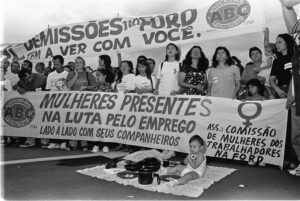Jaime Santos Júnior, Professor in the Department of Sociology at the Federal University of Paraná, Curitiba, PR, Brazil.
Marilda Aparecida de Menezes, Collaborate Professor at Federal University of ABC, Santo André, SP, Brazil, and University of Campinas, Campinas, SP, Brasil.
The article “Stories of militant women from the perspective of their sons: political engagements”, published in dossier Education and Political Behavior, in the journal Educação & Sociedade (vol. 42), analyzed the place of political passions in the families of former union militants based on the following hypothesis: the sons grasp of their parents’ memories, in very different social settings, mobilize different symbolic and emotional goods that reveal not merely a break with their parents political engagements, but a shift in the way they establish affective bonds with political positions. The researchers Jaime Santos Júnior and Marilda Menezes, from the Federal University of Paraná and the Federal University of ABC, respectively, made use of the findings from a research project they analyzed, which covered, comparatively, the memories of the historic strikes of metallurgists of ABC Paulista and of the sugarcane workers in Pernambuco spanning from the late 1970s to 1980s. The aforementioned study was carried out between 2017 and 2019 with the purpose of understanding how the trajectory of militant parents’ resonated in their sons’ in the family setting.
The extent of the analysis, incorporating the cases of the sons and daughters of the former union militants has informed our methodology of the study of memories. In fact, it was not just a matter of inserting new facts into the narrative about the historic strikes of metallurgists of ABC Paulista, already widely documented by specialized literature, but rather to see it from the perspective of memories and the political heritage at work in the daily lives of the families presently. The framework of our research problem brings to light a current issue in Brazil that deals with the challenge of understanding the formation of political engagements in the coming generations. The ethnographic record of the union space as well as the analysis of the life history of the families that comprise our sample combined different procedures to detect permanence and ruptures in regards to the content of generational heritage.
Our findings can be divided into two fronts. First, in theoretical-methodological terms, which inscribe political engagements in the gray zone of affections and emotions, grounded on the studies of Pierre Ansart (2019) and Marcel Mauss (1979). With regards to political feelings associated with values, conceptions of justice and worldviews forged in radically different contexts between the generation of parents and their sons’. Second, in practical terms, in order to refine our claim, we found a difference concerning the affective intensity with reference to the transmission of values and political ethics as well as symbolic goods. That’s to say that the evidence suggests the preservation of political values (conceptions of social justice, citizenship, equality, among others) derived from their parent’s trajectories, to denote how socialization in the family constitutes an important parameter for political education in the broadest sense. Nonetheless, the frailty of these bonds is staggering when it comes to the unwavering defense of what is expressed as personal choices. This is the intensity gradient. In short, letting go of one’s default political position, given their upbringing and social setting, is less serious in their sons’ trajectories. In fact, this is not conclusive, as the authors continue to research some aspects that have been less explored, such as religion and educational investments. That is yet to come.
References
ANSART, P. A gestão das paixões políticas. Curitiba: Ed. UFPR, 2019.
MAUSS, M. A expressão obrigatória dos sentimentos. In: OLIVEIRA, R.C. (org.). Mauss – antropologia. São Paulo: Ática, 1979.
SANTOS JUNIOR, J. and MENEZES, M. A. À margem da história? Mulheres metalúrgicas e a memória das greves do ABC (1978–1983). In: LEITE LOPES, J. S. and HEREDIA, B. A. (orgs.). Movimentos cruzados, histórias específicas. Rio de Janeiro: Editora UFRJ, 2019.
To read the article, acess
SANTOS JUNIOR, J. et al. Histórias de mulheres militantes na perspectiva dos(as) filhos(as): (des)engajamentos políticos. Educ. Soc. [online]. 2021, vol. 42 e240824. ISSN: 1678-4626 [viewed 14 February 2021]. https://doi.org/10.1590/es.240824. Available from: http://ref.scielo.org/mbk2yq
External links
Academia.edu: https://unicamp.academia.edu/EducaçãoeSociedade
Civitas – Revista de Ciências Sociais: https://www.scielo.br/scielo.php?pid=S1519-60892019000300675&script=sci_abstract&tlng=pt
Educação & Sociedade – ES: www.scielo.br/es
Facebook: https://www.facebook.com/ES.cedes/
Lattes Jaime Santos Júnior: http://lattes.cnpq.br/1838123939044180
Lattes Marilda Aparecida de Menezes: http://lattes.cnpq.br/9822634790399791
LinkedIn: www.linkedin.com/in/educação-e-sociedade
Mendeley: https://www.mendeley.com/profiles/educao-e-sociedade/
Programa de Memória dos Movimentos Sociais – Movimentos Cruzados, Histórias Específicas: http://www.memov.com.br/site/index.php/component/content/article/17-livros-e-outras-publicacoes/livros-memov/242-movimentos-cruzados-historias-especificas?Itemid=101
Programa de Memória dos Movimentos Sociais: http://www.memov.com.br/site/index.php
Como citar este post [ISO 690/2010]:













Recent Comments